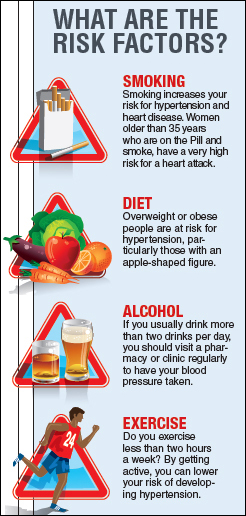
To recap: Hypertension doesn't have to be deadly. It's easy to diagnose and, once you know you have it, it can be controlled.
1st Take Charge Step: Understand the concept of hypertension and the numbers.
- Just as too much air pressure can damage a tyre, high blood pressure (hypertension) can damage your blood vessels, particularly your arteries and other vital organs.
- Hypertension is diagnosed when blood pressure is consistently above 140/90mmHg (if you're 60 or younger) or above 150/90mmHg (if you're older than 60).
2nd Take Charge Step: Don't be fooled by the lack of symptoms.
- About 95% of people with hypertension have no symptoms as all, and only learn of their hypertension during a routine examination or an examination for some other problem, or unexpectedly have a stroke or heart attack.
- This is why all adults, even those who feel "healthy" and have a healthy lifestyle, should have their blood pressure checked regularly.
3rd Take Charge Step: Identify the triggers to limit exposure.
Consistently high blood pressure can, over time, cause major and life-threatening organ damage to your arteries, heart, brain, kidneys and eyes. The only way to prevent this course of events involves lifestyle changes and prescribed medication. So, your health is in your own hands.
Your 4th Take Charge Step: Know your real risk
Did you know that some factors may increase your chances to develop hypertension and, once your blood pressure is consistently too high, some associated factors will increase your risk of developing organ damage to your arteries, heart, brain, kidneys and eyes? This, in turn, can increase blood pressure. A vicious cycle will be the end result.

QUIZ: Assess your risk
Answer the following questions truthfully:
1. Are you a smoker?
Yes
No
2. Do you have high blood cholesterol levels?
Yes
No
3. Do you have a family history of high blood pressure or diabetes (brother/sister, father/mother)?
Yes
No
4. Do you have type 1 or type 2 diabetes?
Yes
No
5. Are you older than 50 years?
Yes
No
6. Are you from African ethnicity?
Yes
No
7. Are you overweight, especially around the waist? If you're male, is your waist circumference >102cm or, if you're female, is your waist circumference >88cm?
Yes
No
8. Do you have a family history of early coronary artery disease in a parent or sibling (before age 45 for men or 55 for women)?
Yes
No
9. Do you have bad eating habits, particularly high sodium (salt) intake and low intake of potassium, magnesium and calcium (fruits, vegetables and dairy)?
Yes
No
10. Do you drink more than two drinks daily?
Yes
No
11. Do you have an inactive lifestyle? Do you exercise less than two hours per week?
Yes
No
12. Do you use the Pill or steroids, such a cortisone and anti-inflammatory drugs? (These may all contribute to higher blood pressure).
Yes
No
13. Do you abuse drugs like tik, cocaine and other amphetamine-like drugs? (Hypertension can be very dangerous in these circumstances).
Yes
No
Your doctor will take all your risk factors into account in an individualised management plan. It will influence decisions about when to start drug treatment, as well as the choice of medication.
But this is how he will determine the severity of your condition:
A. If you have answered NO to all questions,
- and your blood pressure is between 140/80mmHg and 150/90mmHg (if you're younger than 60), you'll fall into the low added risk group.
- and your blood pressure is between 160 – 179/100-109mmHg, you have a moderate added risk.
- and your blood pressure is higher than 180/110mmHg, you have a high added risk.
B. If you have answered YES to two or fewer questions,
- and you're otherwise healthy and your blood pressure is between 130/80mmHg and 140/90mmHg, you'll fall into the low added risk group.
- and your blood pressure is between 140/90mmHg and 179/109mmHg, you'll fall in the moderate added risk group.
- and your blood pressure is higher than 180/110mmHg, you're in the very high added risk group.
C. If you have answered YES to three or more questions, or if you have any target organ damage to your heart, kidneys or brain, or if diabetes is the only other condition you've been diagnosed with except hypertension,
- and your blood pressure is lower than 130/85mmHg, you're in the moderate added risk group.
- and your blood pressure is between 130/85mmHg and 180/110mmHg, you're in the high added risk group.
- and your blood pressure is higher than 180/110mmHg, you're in the very high added risk group.
If you have any of the following associated conditions:





and your blood pressure is higher than 120/80mmHg, you'll in the very high added risk group.
FACT: The risk of complications increases along with an increase in blood pressure, but there's no abrupt cut-off point above which complications appear.
Take action:
Determine your own risk profile and then ensure that you keep your blood pressure under control all day long, every day of the month. Every minute of uncontrolled blood pressure equals a minute of unwanted organ damage.
In your next e-tutorial: How to lower your risk - yes you can!




 Publications
Publications
 Partners
Partners













